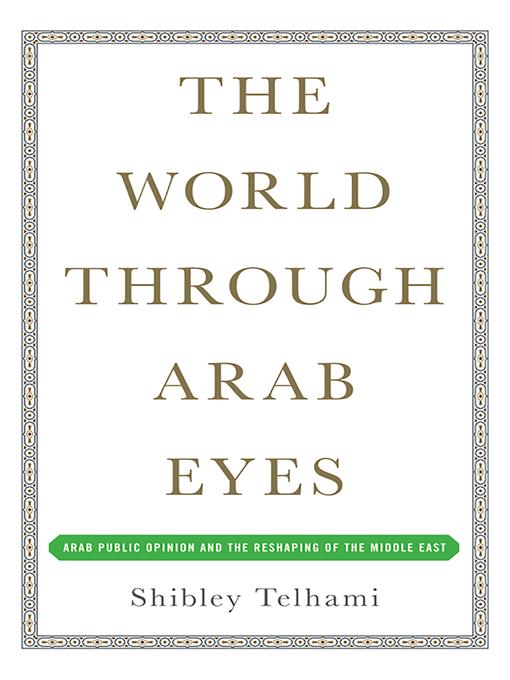
The World Through Arab Eyes
Arab Public Opinion and the Reshaping of the Middle East
کتاب های مرتبط
- اطلاعات
- نقد و بررسی
- دیدگاه کاربران
نقد و بررسی

Starred review from April 22, 2013
Resentment of America and Israel is the “prism” that shapes Arab perspectives, according to this finely calibrated study of public opinion in the Middle East. University of Maryland political scientist Telhami (The Stakes: America in the Middle East) analyzes decades of his own polling data in Egypt, Saudi Arabia, Morocco, Jordan, Lebanon, and the United Arab Emirates, supplemented by polls of Israeli Arabs and Jews and of Americans, to probe evolving views about the international scene and domestic politics and society. His survey partly confirms—and complicates—conventional views of Arab opinion. He finds, unsurprisingly, an overwhelmingly negative view of Israel and the United States, one that is energized by a preoccupation with public dignity and a “hunger for Arab power.” But that antipathy, he contends, is based on policy rather than clashing values: most Arabs, he contends, like American pop culture, support women working outside the home, and favor democracy. Telhami weaves mountains of data into a lucid, thoughtful account of shifting attitudes, one that registers the impact of the Internet and Al Jazeera in changing attitudes and the growing influence public attitudes exert over government policy, especially since the Arab Spring. The result is an unusually rich portrait of the Arab worldview.

May 1, 2013
Arab public opinion, newly codified and relevant. In the wake of President Barack Obama's recent exhortation to young Israelis to look at the world through Palestinians' eyes, this work holds a prescient message at how recent changes in the Middle East have certainly opened the eyes of many Arabs, as well as favorably altered American attitudes toward them. The methodology of the polling undertaken by political scientist Telhami (Peace and Development/Univ. of Maryland; The Stakes: America in the Middle East, 2002) is key. After establishing his own credentials, he explains in detail how the polling was gathered over the last 20 years, then combined with significant changes over the last two years when the authoritarian screens in many of the countries were lifted. As the author writes, "it was obvious that the Arab governments' near monopoly of the media was crucial to limiting public discontent." He focuses mainly on six Arab countries as representative and in which to track public opinion--Egypt, Saudi Arabia, Morocco, Lebanon, Jordan and United Arab Emirates--and divides the narrative into thematic areas of inquiry--e.g., Arab identity, the use of the Internet, the sense of empathy with others, the Palestinian-Israeli crisis, the Arab uprisings, opinion of the United States, Israel and Iran, and shifting attitudes about religion, women and democracy. Arab identity has been deeply shaped in relation to long humiliation by Israel and the West, and the "prism of pain" among all the Arab respondents was the enduring Palestinian-Israeli conflict. Hence, Arabs are still deeply suspicious of Western motives, choose France or Turkey in terms of model countries, and don't necessarily believe that the clergy should have a political role. An intriguing, revealing study of Arabs' changing views of themselves and the world as their countries open up--deserves a wide audience.
COPYRIGHT(2013) Kirkus Reviews, ALL RIGHTS RESERVED.

May 15, 2013
For years, Western pundits and journalists who wrote about the Arab world attributed traits to the Arab peoples and what they thought about different issues based on superficial observations and preconceived notions about the region. Moreover, the authoritarian regimes that have governed the Arab world made it difficult to conduct scientific public opinion polling in much of the Middle East and North Africa. Since the Arab uprisings that began in late 2010, it has become incumbent to know what the average Arab thinks about different sociopolitical issues that affect their everyday lives. Political scientist Telhami (Anwar Sadat Professor for Peace and Development Studies, Univ. of Maryland) is among a handful of scholars who have conducted numerous scientific polls to measure Arab public opinion on a variety of subjects. Drawing upon a decade's worth of polling data, Telhami has written a fascinating and extremely useful book on how Arabs see the world around them and what their aspirations are. The issues covered range from democracy and religion to foreign policy and relations with non-Arab regional states, such as Turkey, Iran, and Israel. VERDICT This book will be extremely useful for students of the contemporary Middle East as well as policymakers and journalists who deal with the Arab world.--Nader Entessar, Univ. of South Alabama, Mobile
Copyright 2013 Library Journal, LLC Used with permission.

























دیدگاه کاربران